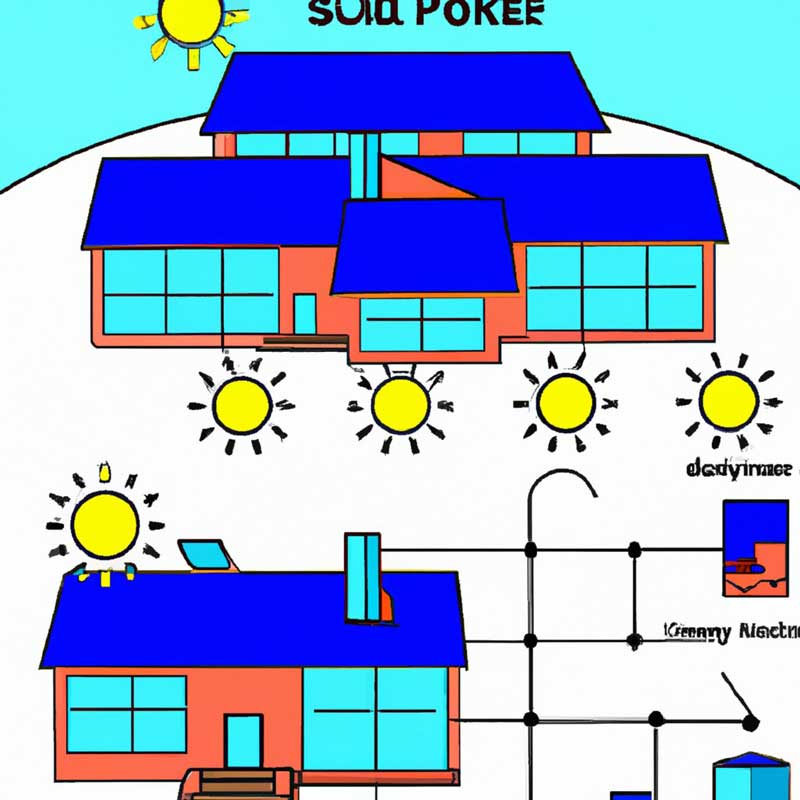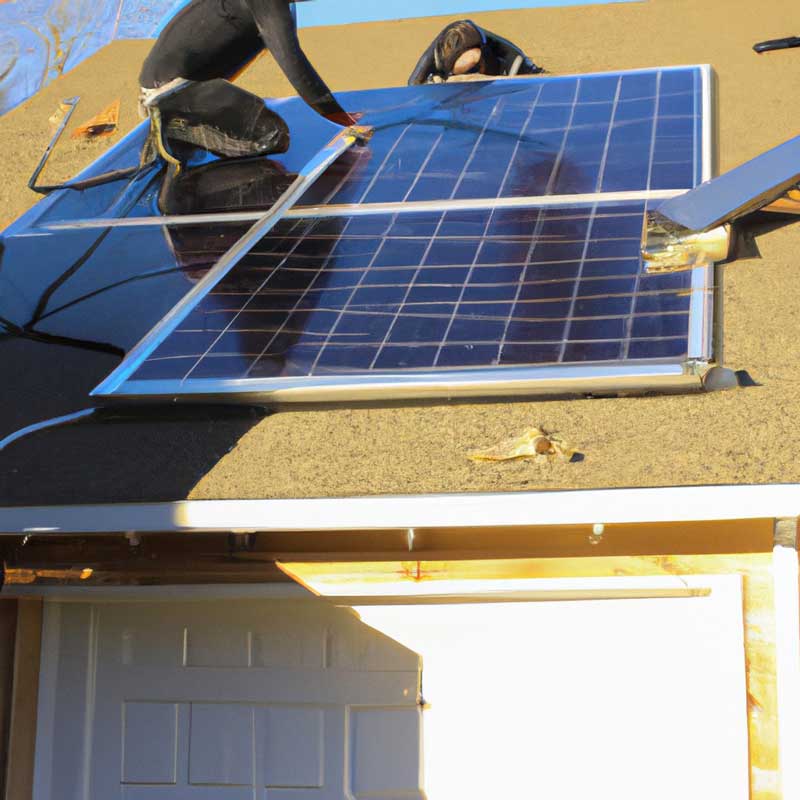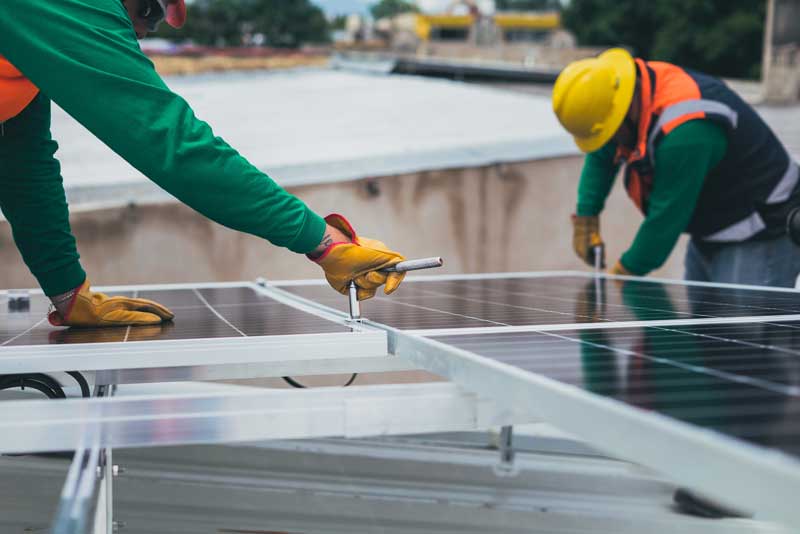Are Solar Panels Worth It for Your Home? (2022 Buyer's Guide)
We have to start with the basics: what are solar panels? Solar panels are devices that convert sunlight into electricity. They are made up of photovoltaic cells, which generate electricity when exposed to light. Solar panels can be installed on a roof, or they can be mounted in a field or on a pole, where they collect sunlight and convert it into energy.
The first thing you will need to do is figure out how much sun your home gets throughout the day. Next, you will need to figure out how many solar panels you would need for your home. You also need to know if there is enough space on your roof for the number of solar panels you want to install. If not, then you might want to consider installing them outside of your home or using an alternative form of installation such as ground-mounted or pole-mounted arrays.
How Do Solar Panels Work for Homes?

Solar panels are a renewable energy source that is gaining popularity as it becomes more affordable.
Solar panels are essentially a way to convert solar energy into electricity. They do this by converting photons from the sun into electrons that can be used for power.
Solar panels can be installed on many different surfaces, but they need to be positioned in a location where they will get the most sunlight possible. The surface of the panel must also be clear of any obstructions like trees or buildings so that it can receive the maximum amount of sunlight throughout the day.
When Are Solar Panels Worth It?
Solar panels are a great way to save money on your electric bill. Solar panels have been around for over 50 years and they have become more efficient and affordable. So what is the catch? The catch is that solar panels are not worth it if you live in an area that has a lot of cloudy days.
Solar panel use cases:
- Solar energy is renewable, which means it will never run out and it does not produce any pollution or greenhouse gases like fossil fuels do.
- Solar energy can be used to power homes as well as electric vehicles which reduces our dependence on fossil fuels and helps the environment.
- Solar energy is cheaper than ever before, solar panel prices have dropped by 80% since 2009 with more price drops expected in the future.
How are Different Types of Solar Panels Used?

Solar panels are a type of photovoltaic (PV) cells that convert sunlight into electricity. They come in various types, each with different characteristics. Solar panels are composed of solar cells, which are made up of semiconductor materials like silicon. There are three types of solar cells: crystalline silicon, thin-film and amorphous silicon. The type you choose will depend on the application and the cost. .
Solar Panel Costs & Benefits for the Average Homeowner
Solar panels are a great investment for homeowners. They can save you hundreds of dollars on your monthly electric bill and help the environment by reducing greenhouse gas emissions.
The average homeowner in the U.S. spends about $1,000 per year on electricity bills, which is enough to cover the cost of installing solar panels for an average-sized home in just 5 years. The solar panels would produce electricity for free and could even generate income by selling surplus power back to the grid.
Solar Panel Installation Process & What You Should Know Before Installing a System at Home

Solar panels are a great way to reduce your energy bills and lower your carbon footprint. Solar panel installation process is not complicated. You just need to know what you should be aware of before installing a system at home.
The solar panel installation process involves a few steps:
1) Planning: Choose the right placement for the panels, consult with an electrician, and get permits if necessary.
2) Installation: Mounting panels on the roof or ground, connecting them to the grid or battery bank, and making sure they are properly grounded.
3) Operation: Monitoring performance and making adjustments as needed (e.g., cleaning panels).
Solar panels are a great way to save on your electricity bills and make the environment a little cleaner. Solar panels have become more popular in recent years, due to their affordability and the government incentives that are available for them.
Choosing a solar panel installation company initially, you will need to decide whether you want to install solar panels on your own or hire a professional. Built-in features in the home such as windows and roofs are often overlooked by homeowners, but they can make a big difference in terms of how well the panels work. If you choose to go with an outside company, they will be able to do site surveys and give you other recommended improvements that could improve your energy savings.
Pros & Cons of Owning A Home With Solar Panels
The Pros of Owning A Home With Solar Panels:
- Low to no maintenance cost on the solar panels.
- The panels can generate power even when there is a blackout.
- You have the ability to sell excess energy back to the grid.
- You can get tax credits and rebates for installing solar panels on your property.
The Cons of Owning A Home With Solar Panels:
- You will need to pay for installation costs upfront, which could be expensive depending on the size of your home or property.
- There are some limitations in where you can install them, so you will need to consult with a professional before purchasing them. .
- You will need to maintain the solar panels over the course of their lifespan, which could be costly depending on if you decide to upgrade them or not.
- You will need to worry about theft and vandalism on your property when installing solar panels, as well as upkeep for them in order for them to continue producing power.
- The lights can only be turned off when it's completely dark out (if it's cloudy or there is any sunlight coming through).
Do Residential Solar Panels Actually Save You Money? The Real Cost of Going Solar at Home
We all know that solar panels are good for the environment, but is it worth the cost? Is it worth the installation and maintenance? When you look at a solar panel system, you will see that it has many components. These components are what make up the cost of a solar panel system.
The debate of solar panels has been around for many years now. There are so many pros and cons to installing a solar panel system in your home or commercial building, but the good certainly outweighs the bad. Solar panels are a great investment for not only your wallet and the environment, but also for your future.
Conclusion: Is it Worth It? How to Make a Decisive Decision about Your Residential Solar Panel Project
It is worth investing in a residential solar panel project. With enough research, it is possible to make a decisive decision about whether or not it is worth it.
Residential solar panel projects have become a popular decision for individuals that are looking to preserve the environment and save money. The upfront cost may seem daunting, but over time and with proper research, it is possible to make a decisive decision about whether or not it is worth it.
An individual interested in investing in a residential solar panel project should start by looking at the cost of the solar panel project and what it will take to pay for it. The cost of a residential solar panel project is typically split into two sections, the upfront cost, and the operational costs. The upfront cost includes things such as labor, purchasing materials, equipment, inspection, etc., while operational costs include things like warranties and maintenance fees.

